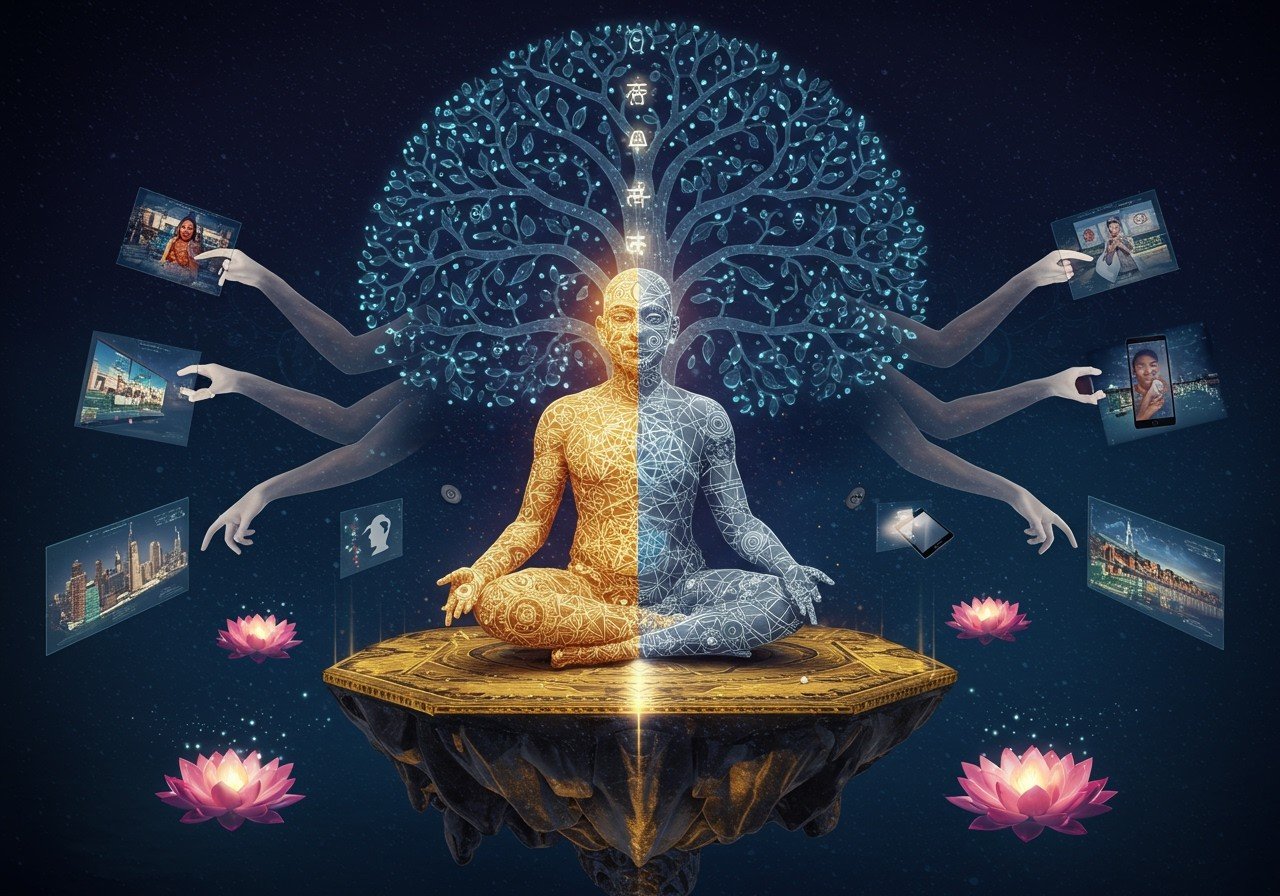Jnana Yoga: A Path to Wisdom in the Modern World

Jnana Yoga, often called the yoga of knowledge, offers a path to self-realization. This path emphasizes wisdom and a deep understanding of reality. As one of the four main yoga paths described in the Bhagavad Gita, Jnana Yoga centers on achieving liberation through insight and is a profound way to connect with your inner self.
In today’s fast-paced world, Jnana Yoga provides a framework for intellectual and spiritual growth, helping individuals lead more balanced lives. The rise of online platforms has made it simpler for people of all backgrounds to explore and share their Jnana Yoga experiences.
Understanding Jnana Yoga: Origins and Philosophy
Jnana Yoga distinguishes itself from other yoga paths like Bhakti Yoga (devotion) or Karma Yoga (action) through its emphasis on self-inquiry. The core of Jnana Yoga lies in understanding one’s true self (Atman) and its connection to universal consciousness (Brahman). This exploration helps practitioners differentiate between illusion and reality.
A key concept in Jnana Yoga is ‘Neti-Neti,’ meaning “not this, not that.” This method of inquiry encourages practitioners to peel away layers of identification to discover their true nature. It’s a process of eliminating what is not the Self to reveal what is.
Jnana Yoga in Modern Life
In our technology-driven world, Jnana Yoga offers tools for navigating the complexities of modern life. It promotes clarity of thought and cultivates emotional stability, both crucial for stress management. By deepening self-awareness, Jnana Yoga enhances our decision-making abilities.
The principles of Jnana Yoga find resonance in modern psychology and mindfulness practices. This alignment with contemporary thought highlights the timeless relevance of this ancient wisdom.
Practical Steps for Beginners
Embarking on the Jnana Yoga path begins with simple yet profound steps:
- Self-Inquiry: Start by asking fundamental questions like, ‘Who am I?’ This introspection initiates the process of uncovering your true Self. Explore your thoughts, feelings, and beliefs to understand their influence on your perception of self.
- Meditation and Contemplation: Meditation is essential for calming the mind, creating space for deeper reflection. Regular practice helps to still the mental chatter and cultivate inner peace. Find a comfortable posture and focus on your breath, allowing thoughts to arise and pass without judgment.
- Study of Sacred Texts: Engaging with scriptures like the Upanishads, Bhagavad Gita, and Brahma Sutras offers foundational knowledge and guidance. These texts provide insights into the philosophical underpinnings of Jnana Yoga. Consider joining online study groups or finding a mentor to enhance your understanding.
- Connect with a Community: Joining a Jnana Yoga community, whether online or in person, provides support and shared learning. Connecting with like-minded individuals can deepen your practice and offer valuable perspectives.
For those seeking resources to enhance their meditation practice, Poojn.in offers a curated selection of meditation beads and other spiritual items. Explore their collection to create a sacred space for your practice.
Core Concepts of Jnana Yoga
- Self-Inquiry: The practice of consistently asking “Who am I?” is central to Jnana Yoga. It is a deep dive into understanding the nature of your being, going beyond superficial labels and roles.
- Discernment (Viveka) and Non-Attachment (Vairagya): These qualities are essential for distinguishing between the real and the unreal. Viveka is the ability to discern truth from falsehood, while Vairagya is the detachment from material possessions and desires. They work in tandem to free the mind from illusions.
- Knowledge vs. Information: Jnana Yoga distinguishes between knowledge (experiential understanding) and information (factual data). True knowledge comes from direct experience of the Self, leading to a deeper connection with the divine. Information is a step towards understanding, and it is through meditation and contemplation it develops into wisdom.
- Acceptance of “Not Knowing”: Embracing the unknown is a critical aspect of Jnana Yoga. It is a humbling recognition that our current understanding is limited and opens us to the possibility of deeper insights. This acceptance creates space for true learning and spiritual growth.
Beginning Your Jnana Yoga Journey
- Questioning: Begin by challenging your assumptions about yourself and the world around you. Consistent questioning helps to break down limiting beliefs and opens up new avenues for understanding.
- Study: Immerse yourself in the study of sacred texts like the Upanishads, Bhagavad Gita, and Brahma Sutras. These texts provide a rich foundation for understanding the principles of Jnana Yoga. Supplement your study with talks and lectures by experienced teachers.
- Meditation and Contemplation: Regular meditation is crucial for calming the mind and cultivating inner stillness. This allows for deeper self-reflection and facilitates the process of self-inquiry. Contemplation on the teachings from your studies further deepens your understanding.
- Breathwork (Pranayama): Incorporate pranayama practices to regulate your breath and enhance your meditation practice. Controlled breathing helps to calm the nervous system and create a more receptive state for self-inquiry.
- Introspection: Dedicate time for introspection to examine your thoughts, emotions, and beliefs. This process of self-examination is key to uncovering the layers of conditioning that obscure your true nature.
- Comfortable Posture: Maintaining a comfortable and stable posture during meditation is essential for allowing the mind to settle. Whether you choose to sit on a cushion, chair, or even lie down, prioritize comfort and alignment.
- Relaxation: Begin your meditation practice with relaxation techniques to release physical and mental tension. Deep, slow breaths help to calm the body and prepare the mind for deeper contemplation.
- Self-Study (Svadhyaya): Svadhyaya, the practice of self-study, is an integral part of Jnana Yoga. It encourages self-reflection and a deeper understanding of your own thoughts, emotions, and motivations.
Poojn.in offers a range of spiritual items that can support your Jnana Yoga practice. From meditation cushions to incense, you’ll find resources to create a conducive environment for self-reflection.
Important Considerations for Jnana Yoga
- Beyond Intellectualism: Jnana Yoga is not merely an intellectual pursuit but a transformative practice. It requires sincere self-inquiry and a willingness to go beyond intellectual understanding to direct experience of the Self. Embrace the journey of inner exploration rather than simply accumulating information.
- Ego Awareness: The ego can be a significant obstacle on the path of Jnana Yoga. Be mindful of the tendency to believe you already know everything. Intellectual pride can hinder genuine self-discovery. Cultivate humility and a willingness to learn, recognizing that true knowledge of the Self comes through direct experience.
- One-Pointed Concentration: Focus your attention on the question “Who am I?” and be prepared to let go of preconceived notions and ingrained beliefs. True self-inquiry requires a willingness to delve beneath the surface of your conscious mind to uncover the deeper truths of your being.
Deepen your understanding of Jnana Yoga with Poojn.in’s informative articles and resources, such as Yoga and Spirituality: A Harmonious Connection and Finding Your Inner Calm: Meditation Techniques for Beginners. These resources can support your exploration of this transformative path.


